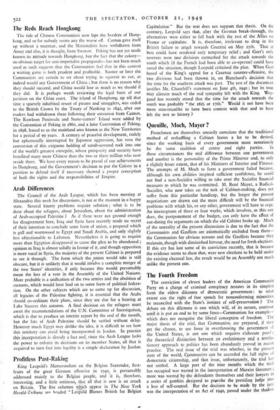Queuille, Moch, Mayer ?
Frenchmen are themselves uneasily conscious that the traditional method of reshuffling a Cabinet leaves a lot to be desired, since the working basis of every government must notoriously be the same coalition of centre and right parties. In these circumstances the real difference between one government and another is the personality of the Prime Minister and, to only a slightly lesser extent, that of his Ministers of Interior and Finance. The attempts of M. Moch to form a government failed because, although his own abilities inspired sufficient confidence, he could not find a non-Socialist willing to take over the Socialist financial measures to which he was committed. M. Rene Mayer, a Radical- Socialist, who now takes on the task of Cabinet-making, does not suffer from this particular handicap, but the longer the present negotiations are drawn out the more difficult will be the financial problems with which his, or any other, government will have to cope. An interregnum of three or four weeks, which involves, as this one does, the postponement of the budget, can only have the effect of out-dating the arguments on which the old Cabinet broke up. Much of the unreality of the present discussions is due to the fact that the Communists and Gaullists are axiomatically excluded from them— the Communists for obvious reasons and the Gaullists because they maintain, though with diminished fervour, the need for fresh elections. If this cry has lost some of its conviction recently, that is because the evidence seems to show that, were new elections to be held under the existing electoral law, the result would be an Assembly not much unlike the present one.


































 Previous page
Previous page